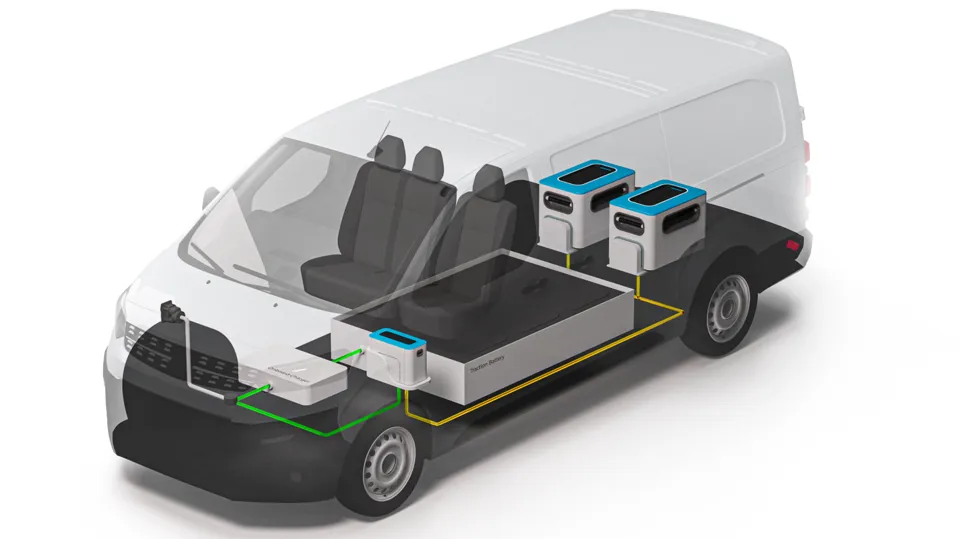An innovative start-up company believes it has the answer to the biggest dilemma facing fleet operators looking to transition to electric: how to recharge return-to-home vans.
With an estimated 70% of company vans taken home at night and 70% of those unable to be charged due to lack of off-street parking, the issue is a significant blocker to electric van uptake, according to research carried out by the Association of Fleet Professionals in conjunction with Fleet Dynamics.
OnCharge, conceived by venture developer Philip Clarke, has created a 50kW battery pack which is collected from a hub and plugged into the van ready to begin charging when parked up at home
It is poised to begin testing the overnight ‘charging as a service’ solution with a national fleet operator with a view to extend trials with more fleets later this year.
Clarke, an electric vehicle driver for the past five years, interviewed around 50 fleet operators, as well as battery swapping and mobile charging companies, before arriving at his personal eureka moment.
He has pulled together an experienced team of advisors, including former Mitie director of sustainability, social value and fleet Simon King and ex-Octopus EV director of technology and innovation Claire Miller, to help finesse the product.
“We found that 20% of drivers have to charge their van every day and 45% have to charge every other day,” Clarke said. “If you can’t charge at home, it eats into the working day or into your personal life – neither is great for the business or the driver when they lose at least an hour of time sitting on a public charger.
“Our mission is to make it easier for essential fleets to transition to electric.”
Working with fleets for the past year has helped Clarke to understand the various use cases based on different journey profiles. He has also spoken to driver panels to better understand their behaviours and how they really use their vans (for example, half the drivers at one fleet were rapid charging on DC everyday even though most didn’t need to).
It has led to the formation of four business scenarios:
- A hub-based solution where drivers visit their local hub, located on a trading park or high traffic area, on their way home. The battery pack is plugged into the van – initially manually, but ultimately via autonomous vending - in less than 90 seconds to charge it up overnight at 7kW. Hubs will be located within eight minutes of the driver’s journey home.
- A similar solution to scenario one, but where the hubs are located at the company depot or office.
- Higher mileage fleets that require charging during the day wish to carry the battery around to plug it in whenever a boost is required. This range extension solution may be particularly suited to fleets operating in remote areas, although it will affect payload: the battery currently weighs more than 200kg although lightweight solutions are being looked into.
- An off-board power option to enable the fleet to run generators via the van without draining the main battery.
“Our priority is to initially look at the first two scenarios, which are essentially the same in terms of our development plans,” Clarke said. “We begin proof of concept trials with a big courier firm in June and will expand the trials later this year.”
He is in the middle of a modest fundraising process in order to scale the business with a target of opening 200 hubs by 2030, rising to 1,000 by 2040. Each hub is designed to serve 40 vans per day, resulting in capacity of 8,000 by 2030 and 40,000 by 2040. Their location will be dictated by the fleets.
“We are prioritising the mega fleets for strategic relationships,” Clarke said.
Preparing the vans to accept the batteries is a straightforward process involving fitment of a secondary loom to meet safety protocols and bracketing to ensure the powerbank is secure. It will be carried out by specialist converters, including Bott and Bri-Stor, and takes less than two hours.
The work is fully warrantied by OnCharge and is not expected to affect the manufacturer warranty. Clarke is in talks with several manufacturers with one having already expressed an interest in collaborating on the prototypes.
Although the standard battery pack will offer 7kW charging, it is capable of charging at 11kw or even 22kW if necessary. The only constraint is the van’s own on-board charger which is often restricted to 7kW for AC charging.
Once the van has been charged overnight, the driver drops off the battery at the hub the following morning. The pack is then recharged but it also has vehicle-to-grid capability to support network capacity during the day.
“We had a few fleets raise concerns about the drivers forgetting to drop off the battery, so we are looking at behavioural things such as free coffee to encourage them to remember,” added Clarke.
“The key thing is speed – we can’t have queues. Most fleets said they want to reserve their charge space which we can do either by tracking the charge on the van or by simply booking a slot. We will ‘air traffic control’ the vehicles in. Although everyone has a slot, they can move dynamically if someone is late.”
Pricing will be similar to DC charging on the public network at around 70-75p per mile, although profits made from grid connectivity could bring that down over time. However, the productivity savings from having the driver on the road for a full working day and not sitting for an hour or more at a public charge point will evidence the return on investment, according to Clarke.
** Come and find out if the OnCharge proposition will suit your business at Fleet & Mobility Live on October 3-4 at Birmingham NEC. OnCharge will be a key feature in the Tomorrow’s Fleet innovation zone together with First Hydrogen, whose hydrogen fuel cell van is just entering trials, new Chinese EV manufacturer Nio and Clean Motion.



















Login to comment
Comments
No comments have been made yet.